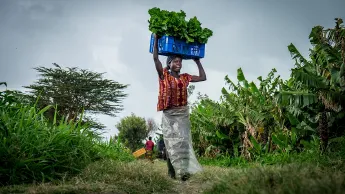Global solutions to achieve greater food security
- 2024-09-16
- Miriam Hoffmeyer
- Comment

The number of starving people worldwide remains alarmingly high. The FAO, the Food and Agriculture Organisation of the United Nations, estimates that in 2023 up to 757 million people were affected by food insecurity and malnutrition – despite the extensive aid resources that are expended each year to combat hunger. The ‘Ensuring Food Security by Empowering Vulnerable Populations Beyond External Aid’ held on 16 August saw four alumni of the presenting innovative solutions to sustainably improve food security and reduce dependency on external aid.
Innovative approaches to improving food security
‘Hunger is a violation of human dignity’, said ISA alumna Sneha Murali as she kicked off the event that she jointly moderated with her former fellow student Chibunna Ogbonna. The was launched in 2019 and is financed by the Federal Ministry for Economic Cooperation and Development (BMZ). Its objective is to strengthen international cooperation in implementing the . Each year twelve to twenty beneficiaries from the Global South visit Hamburg to further develop their individual projects in cooperation with German higher education institutions and international organisations. The programme and its extensive alumni network has contributed to establishing a global community of experts in sustainability, said ISA project manager Barbara Makowka.
Urban farming as an approach to achieving greater food security
The discussion started with from the Democratic Republic of the Congo presenting his current project. He is Dean of the Faculty of Agricultural Sciences at the University of Goma, where hundreds of thousands of people live in refugee camps in the surrounding area. This expert in genetics and plant cultivation, together with his team, bred 24 new varieties from an indigenous rice plant. These are now being tested out in the open to promote agricultural production in the region and thus reduce dependency on food imports.
Sebigunda also referred to the significance of in terms of food security: there are many brownfield sites in the region that could be used for cultivation. Some 400 allotments have been created around the refugee camps as part of the project, so that people can supply their own vegetables. ‘We need to develop our own technologies and help ourselves’, said Sebigunda.
Underlying political conditions for sustainable agriculture in Kenya
, an expert in strategic management and sustainability in Kenya, also relies on indigenous cultivated plants rather than the copyright-protected seeds from the three large agrochemical concerns that dominate the world market. The focal point of her project in Eldoret, Western Kenya, is the ecological cultivation of indigenous vegetables that are rich in nutrients and resistant to drought, and are therefore better adapted to climate change.
Onjangore emphasised that the project was also focusing on marketing and consumption in addition to production: ensuring a sustainable food supply requires all protagonists to be included in the value chain. The expert criticised the fact that Kenyan seed legislation disadvantages the seed banks of local communities and demanded better underlying political and legislative conditions.
Support for small farmers in Ghana via ‘village savings and loans’
Agribusiness expert from Ghana supports small farmers with the further development of their farms. The lack of access to capital is a major obstacle in this respect, Fordi believes. The ‘village savings and loans’ approach has proven to be effective. It involves villagers saving collectively and using these savings to procure better equipment, for example.
In addition to loans at an affordable interest rate, training would also be required to enable farmers to increase their production and thus be able to realise sustainable improvements in their income, said Fordi. He works as a technical advisor at the Deutsche Gesellschaft für Internationale Zusammenarbeit (GIZ) GmbH in the context of its programme . He also referred to the importance of developing infrastructure: ‘We need good road networks to enable us to transport food from the production centres to the markets where they’re most needed.’
Funding of women’s groups in Nepal to combat undernourishment
, an expert in food quality and food security, presented his ISA project, which has already benefited some 50 women’s groups in various regions of Nepal where undernourishment is widespread. The women learn to independently prepare and also to sell a food product that is particularly rich in nutrients and is based on local grain varieties. The groups are now organised by local authorities and are technically supported by NuAge Nepal, a start-up co-founded by Udash which promotes young people’s commitment to the SDGs.
Critical discussion regarding the effectiveness of international aid
The audience, including many ISA alumni, participated in lively discussion during the chat session. This included criticism of the fact that international aid mostly flows into increased food production, whereas proper storage and transport are neglected. A large proportion of the harvest in Sub-Saharan Africa perishes before the products reach consumers. The podium guests were in agreement that international support should primarily aim to bolster capacities at a local level – by means of better education, access to self-cultivated seeds and affordable loans, and the strengthening of local communities. They felt that the most important prerequisite for this would be for the Global North and the Global South to face each other as equal partners.
Related links
The combined impact of the COVID-19 pandemic, climate change and the war in Ukraine has resulted in rising food prices and an acute shortage in staple crops globally. Millions of people are now on the verge of hunger.
Zero hunger by 2030 - this is the goal the UN has set itself. Projects from Germany are helping achieve this.
